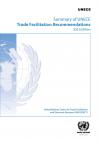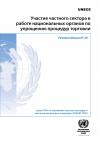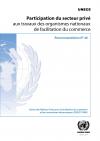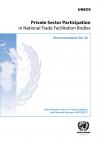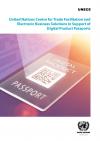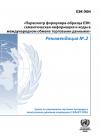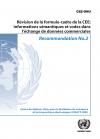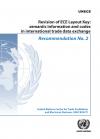Publications
Displaying Results 1 - 8 of 8
- English
This publication (ECE/TRADE/475) provides the following information on each recommendation:
Brief description
Equivalent ISO standard number (where appropriate)
Current status, indicating whether the recommendation is under development, approved or under revision
Dates and publication numbers of documents containing the first approved and last revised versions of the recommendation
Indication and
- Pусский
Цель данной рекомендации состоит в том, чтобы довести до сведения правительств, насколько важным является активное участие частного сектора в работе национальных органов по упрощению процедур торговли (НОУТ) в целях повышения их значимости, легитимности и эффективности. В Рекомендации Европейской экономической комиссии Организации Объединенных Наций (ЕЭК) № 4, первоначально утвержденной в 1975
- Français
L’objet de la présente recommandation est de sensibiliser les pouvoirs publics à la nécessité de faire participer activement le secteur privé aux travaux des organismes nationaux de facilitation du commerce (ONFC) afin de rendre ces derniers plus pertinents, plus légitimes et plus performants. Dans la Recommandation no 4 de la Commission économique pour l’Europe (CEE), initialement approuvée en
- English
The purpose of this recommendation 48 (ECE/TRADE/479) is to communicate to governments how important the active engagement of the private sector is in national trade facilitation bodies (NTFBs) for strengthening their relevance, legitimacy and performance. The United Nations Economic Commission for Europe (ECE) Recommendation No. 4, originally approved in 1975 and revised in 2015, stressed that
- English
Digital tools can play an important role in accelerating the shift to a circular economy. Digital tools can increase transparency along value chains and provide information, which in turn can help to extend the lifecycle of products.
Digital Product Passports (DPPs), for example, can inform consumers and businesses about products, materials, the conditions under which they are produced and their
- Pусский
Рекомендация № 2 Европейской экономической комиссии (ЕЭК) Организации Объединенных Наций была первоначально утверждена одновременно с Рекомендацией № 1 ЕЭК «Формуляр-образец Организации Объединенных Наций для внешнеторговых документов», чтобы подчеркнуть важность четкого определения используемой в документах информации и рекомендовать применение перечней кодов, когда это возможно. Позднее она
- Français
La Recommandation no 2 de la Commission économique pour l’Europe (CEE) a été initialement approuvée en même temps que la Recommandation no 1 intitulée « Formule-cadre des Nations Unies pour les documents commerciaux » afin de souligner qu’il importait d’arrêter une définition univoque des informations figurant dans les documents et de recommander l’utilisation de listes de codes dans la mesure du
- English
United Nations Economic Commission for Europe (ECE) Recommendation No. 2 was originally approved at the same time as ECE Recommendation No. 1: United Nations Layout Key for Trade Documents to underline the importance of unambiguous definition of the information in documents and to recommend the use of code lists to the extent possible. It was later integrated into the United Nations Layout Key


